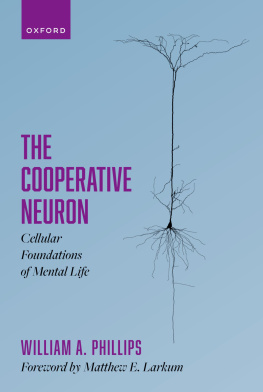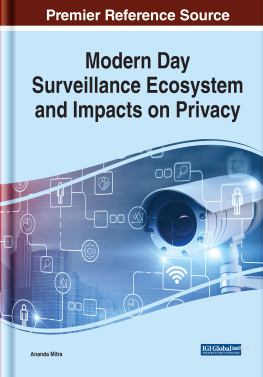CELLULAR CONVERGENCE AND THE DEATH OF PRIVACY
Cellular Convergence and the Death of Privacy
Stephen B. Wicker


Oxford University Press is a department of the University of Oxford. It furthers the Universitys objective of excellence in research, scholarship, and education by publishing worldwide.
Oxford New York
Auckland Cape Town Dar es Salaam Hong Kong Karachi Kuala Lumpur Madrid
Melbourne Mexico City Nairobi New Delhi Shanghai Taipei Toronto
With offices in
Argentina Austria Brazil Chile Czech Republic France Greece Guatemala Hungary
Italy Japan Poland Portugal Singapore South Korea Switzerland Thailand
Turkey Ukraine Vietnam
Oxford is a registered trade mark of Oxford University Press in the UK and certain other countries.
Published in the United States of America by
Oxford University Press
198 Madison Avenue, New York, NY 10016
Oxford University Press 2013
All rights reserved. No part of this publication may be reproduced, stored in a retrieval system, or transmitted, in any form or by any means, without the prior permission in writing of Oxford University Press, or as expressly permitted by law, by license, or under terms agreed with the appropriate reproduction rights organization. Inquiries concerning reproduction outside the scope of the above should be sent to the Rights Department, Oxford University Press, at the address above.
You must not circulate this work in any other form and you must impose this same condition on any acquirer.
Library of Congress Cataloging-in-Publication Data
Wicker, Stephen B.
Cellular convergence and the death of privacy/Stephen B. Wicker.
pages cm
Includes bibliographical references and index.
ISBN 9780199915354 ((hardback) : alk. paper)
1. Cell phone systemsLaw and legislationUnited States. 2. Data protectionLaw and legislationUnited States. 3. Electronic surveillanceLaw and legislationUnited States. 4. Privacy, Right ofUnited States. I. Title.
KF2780.W53 2013
342.730858dc23
2013005109
9 8 7 6 5 4 3 2 1
Printed in the United States of America on acid-free paper
Note to Readers
This publication is designed to provide accurate and authoritative information in regard to the subject matter covered. It is based upon sources believed to be accurate and reliable and is intended to be current as of the time it was written. It is sold with the understanding that the publisher is not engaged in rendering legal, accounting, or other professional services. If legal advice or other expert assistance is required, the services of a competent professional person should be sought. Also, to confirm that the information has not been affected or changed by recent developments, traditional legal research techniques should be used, including checking primary sources where appropriate.
(Based on the Declaration of Principles jointly adopted by a Committee of the American Bar Association and a Committee of Publishers and Associations.)
You may order this or any other Oxford University Press publication by visiting the Oxford University Press website at www.oup.com .
To Sarah
Contents
A DILIGENT READER of the New York Times will have noticed that articles on electronic privacy have become an almost daily occurrence. This is due to two trends: an increasing sensitivity on the part of the public and a dramatic increase in the threat to privacy caused by modern technology. With regard to the latter, cellular technology has become the biggest contributor. Cellular has always been a surveillance technology, but cellular convergencethe recent tendency for all forms of communication to converge onto the cellular handsethas dramatically increased the ability of service providers, law enforcement, and marketers to collect data that reveals the behavior, preferences, and beliefs of cellular telephone users. This book explores this threat, and then considers possible solutions. Along the way, we will see that the immense potential for cellular has been inhibited by its twin stewards, the Federal Communications Commission (FCC) and the service providers. This is the story of a technology that may change the face of politics and economics, but the nature of that change remains up in the air. Cellular may become an empowering instrument for speech and self-actualization, or it may just continue to drift toward a refined tracking technology whose primary role is to promote consumption. We shall see.
I have been privileged to serve for the past eight years as the Cornell Principal Investigator for the National Science Foundation (NSF) TRUST Science and Technology Center, a center dedicated to cybersecurity, privacy, and the protection of the nations critical infrastructure. At the kickoff meeting for the TRUST center in 2005, I gave a talk on the use of sensor networks in public spaces. After my talk, I was cornered by Pam Samuelson, a distinguished member of the faculty of the University of California at Berkeley Law School. She wanted to know how I addressed the issues of disclosure and consent. Under the gentle pressure of those questions, I began to develop my appreciation for the field of privacy. This book is in no way Pams fault, but she certainly gave me the initial impetus to write it.
Some of the work described here was funded by the NSF through the TRUST Science and Technology Center; I happily acknowledge the ongoing support of Dr. Sylvia Spengler. I am also grateful for the support of the NSF Trustworthy Computing Program, with special thanks to Dr. Lenore Zuck.
Several others have provided motivation and collaboration along the way, with particular thanks to my colleagues Lee Humphreys, Steven Jackson, Deirdre Mulligan, Shankar Sastry, Dawn Schrader, Phoebe Sengers, and Bob Thomas. I am eternally indebted to all forty-four of my past and present doctoral students, but I want to acknowledge those who followed me into the world of privacy, particularly Dipayan Ghosh, Shion Guha, Nathan Karst, Bhaskar Krishnamachari, Mikhail Lisovich, and Stephanie Santoso. I offer particular thanks to Stephanie for her contributions to the final chapter of this book.
I would like to thank those who read and commented on all or part of the manuscript. In particular, I want to thank my oldest (that is, my most long-standing) friend Jeff Pool. I dont know how an excellent actor, singer, and mediocre basketball player became an expert on cellular communications, but I remain grateful for the benefit to me. I would also like to thank my friends Susan Compton and John Saylor, and Adam and Tonya Engst for their comments on various chapters, their ideas, their ruthless gamesmanship, and their companionship during a glorious trip to Eleuthera. I continue to lean on you all.
I would like to thank my older children, Alex and Elena, for their encouragement and comments on my work. They attended my talks when they could and provided valuable foils for my ideas. They also kept me going during a difficult time in all our lives through shark dives and painful workouts. Their younger brother Julian is thanked for sleeping through the night, to the extent he did, and for happily distracting his father when he needed it most.
Thanks also to my brother Richard, who led us all through the difficult time. Losing both parents in a matter of months is frankly awful. Having a brother willing to take on the burdens of care and administration is priceless. This book would not have been finished without his efforts.
Next page









